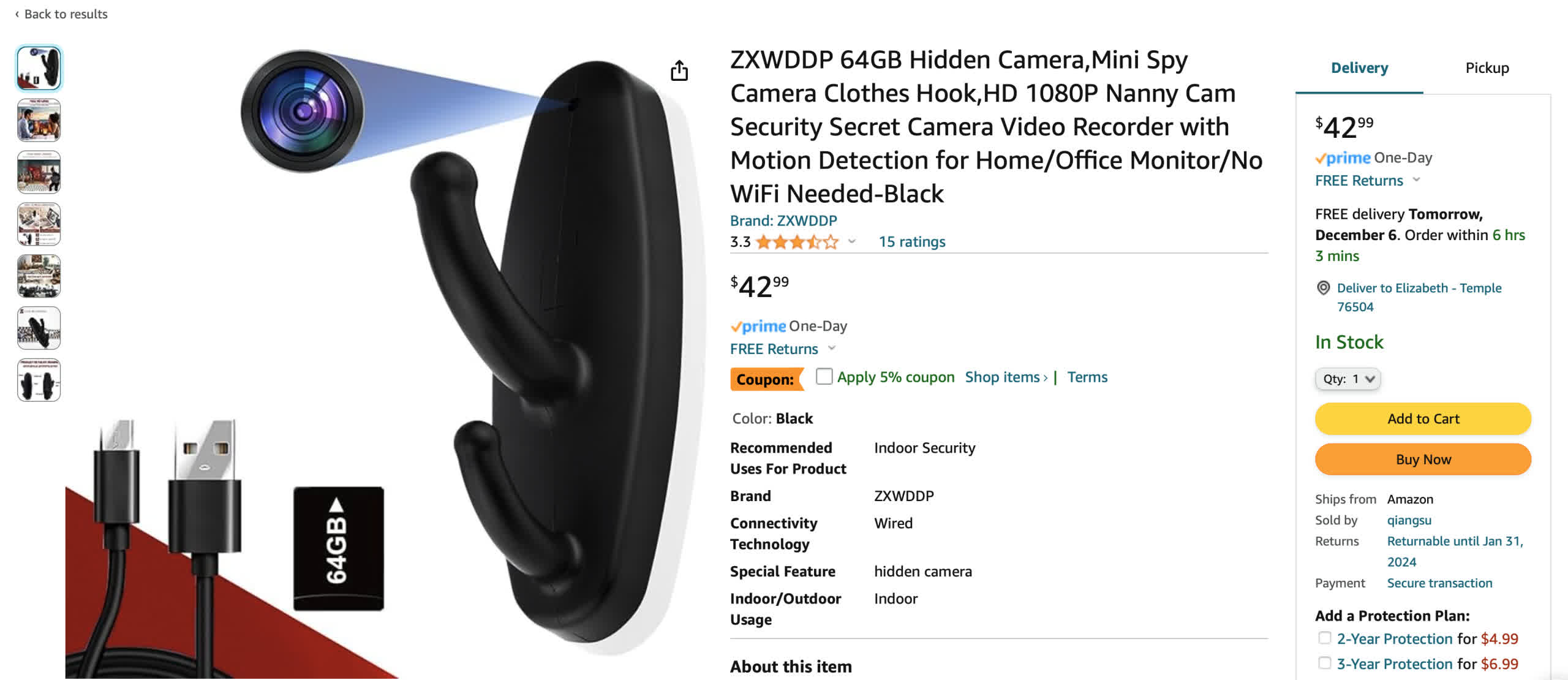In context: Amazon faces personal and punitive damages in a lawsuit involving a spycam sold on its platform used to record a minor's "private moments" in her bathroom. The retail giant feels it isn't responsible for third-party sales used illegally by customers and claims it is "shocked" that someone used the product that way.
The lawsuit's plaintiff is a Brazilian minor of unspecified age who was living with a host family in West Virginia. Darrel Wells, the homeowner of the host family, allegedly installed a camera disguised as a towel hook in the girl's private bathroom and recorded her for months.
After filing a motion to dismiss in April, a federal district judge has ruled that "shock" is not a valid justification for throwing out the case. He was not buying Amazon's reasoning, saying it's hard to believe the company was shocked when its Product Safety Team approved the marketing copy and images suggesting customers use it for spying in bathrooms.
"Amazon approved product descriptions suggesting consumers use [the spycam] to record private moments in a bathroom," wrote US District Judge Robert Chambers in his opinion. "Amazon cannot claim shock when a consumer does just that. These allegations raise a reasonable inference Amazon sold a camera knowing it would be used to record a third party in a bathroom without their consent."
The marketing material on the now-removed product page showed a picture of bath towels hanging on hooks with the ad copy reading, "It won't attract attention" and "A very ordinary hook." It also contained a caption pointing toward one of the hooks that said, "REC on video." The copy in the product's description was similar, with plaintiff attorneys saying, "The whole vibe was just kind of creepy."
Judge Chambers also dismissed Amazon's argument that it was not responsible for "physical" damages because none were listed. The plaintiff claims the incident caused "chronic tremors, insomnia, headaches, nausea, hypotension with associated blurred vision, dizziness, compulsive overeating, avoidance behavior, and paranoia." Amazon's legal team claiming these are not physical damages didn't fly with the judge.
"If proven, [the plaintiff's] damages are severe," Chambers wrote. "Emotional trauma inflicted during a child's 'tender years' has an 'indelible effect' from which 'they may never recover.'"
Both sides are highly concerned with the outcome of the case.
The plaintiff's attorneys feel a win would set needed precedence since there aren't many cases regarding this and other recent technological devices being misused or irresponsibly sold. Amazon's legal team thinks a ruling in the plaintiff's favor is dangerous and would lead to a defacto outlawing of similar devices, even when legitimate uses exist.
Although Judge Chambers denied Amazon's motion to dismiss, he mentioned that the burden is on the plaintiff to prove the "foreseeability" of the illegal use that Amazon appears to have missed.
"Generally, a person does not have a duty to protect others from the deliberate criminal conduct of third parties," the ruling reads, citing precedence from 1995 and 2020. "Yet a duty of protection may arise if the person's 'affirmative actions or omissions' expose others 'to a foreseeable high risk of harm from the intentional misconduct.' Foreseeability is key."

